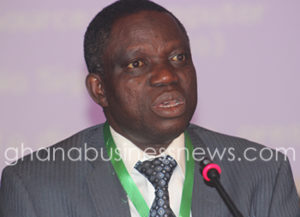Lack of political will impeding regional integration – ECOWAS Trade Director

The Director of Trade at the ECOWAS Commission, Dr Gbenga Obideyi says lack of political will is impeding regional integration progress in the Economic Community of West African States.
He said while African leaders do not shy away from putting pen to paper on regional integration interventions, reluctance sets in when it is time for implementation and technocrats appear to be inefficient in their work.
“When a president of a country signs an agreement, he represents the highest authority of the land but when it comes to implementation then there is some reluctance,” Dr Obideyi told journalists at the opening of a technical workshop in Accra on the Improved and Facilitated Trade in West Africa Project – an ECOWAS regional trade facilitation project funded by the European Union (EU), with technical assistance from the World Bank.
The project funded by the EU – which is involved in several trade-related projects in the region – is focused on improving transparency, promoting regional coordination and standardization and improving efficiency of trade corridors in the ECOWAS sub-region.
Despite several conventions on trade and free movement of people, inter-state road transport and assistance in criminal matters, the ECOWAS community is still challenged with complexities in trans-boundary movement and trade.
The inaugural Africa Regional Integration Index by the UN Economic Commission for Africa (ECA), African Development Bank (AfDB) and the African Union Commission, ranked ECOWAS third out of six sub-regional economic communities. On a scale of 0 to 1, ECOWAS came third with a score of 0.509, behind the Southern African Development Community (SADC) which scored 0.531, and the East African Community (EAC), ranked first with a score of 0.540.
Salifou Tiemtore, Director for Customs at the ECOWAS Commission, said while ECOWAS member states have made strides towards achieving a customs union and a common market, the community has also been hampered by tariff and non-tariff barriers and other counter-productive practices, and intra-regional trade has only ranged between 10 and 14 per cent over the past 25 years.
“Regional Integration is a complex process in West Africa. Following 50 years of independence, we’re still expecting results,” he said.
Compounding the problems of the regional bloc, there are no sanctions for ECOWAS states that fail to implement agreed regional integration policies. The ECOWAS Common External Tariff which commenced implementation in January 2015 for instance, has been adopted by nine member states, while six are still in the process.
“It is one of the problems; here we don’t have it. In other more advanced economic communities there are sanctions. If we start sanctioning, member states will probably decide to be on their own because regional integration is not strong,” Dr Obideyi said, adding that non-compliant countries should be confronted and named.
He also noted that the region is lagging behind in the ease of clearing goods from the ports to the markets, and while it can take as little as six or 12 hours to clear goods in some jurisdictions, it still takes as long as 11 or 12 days in West Africa.
“We have had some member states in our region target 72 hours. It has not worked,” he said.
The EU-funded Improved and Facilitated Trade in West Africa Project is expected to better connect landlocked countries in the ECOWAS region, with sea ports; increase automation of clearance related processes and the efficiency of ports along the coast to promote intra-regional trade.
By Emmanuel Odonkor
Copyright © 2016 by Creative Imaginations Publicity
All rights reserved. This news item or any portion thereof may not be reproduced or used in any manner whatsoever without the express written permission of the publisher except for the use of brief quotations in reviews.
